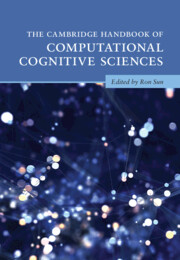Book contents
- The Cambridge Handbook of Computational Cognitive Sciences
- Cambridge Handbooks in Psychology
- The Cambridge Handbook of Computational Cognitive Sciences
- Copyright page
- Contents
- Preface
- Contributors
- Part I Introduction
- Part II Cognitive Modeling Paradigms
- Part III Computational Modeling of Basic Cognitive Functionalities
- Part IV Computational Modeling in Various Cognitive Fields
- 23 Computational Models of Developmental Psychology
- 24 Computational Models in Personality and Social Psychology
- 25 Computational Modeling in Industrial-Organizational Psychology
- 26 Computational Modeling in Psychiatry
- 27 Computational Psycholinguistics
- 28 Natural Language Understanding and Generation
- 29 Computational Models of Creativity
- 30 Computational Models of Emotion and Cognition-Emotion Interaction
- 31 Computational Approaches to Morality
- 32 Cognitive Modeling in Social Simulation
- 33 Cognitive Modeling for Cognitive Engineering
- 34 Modeling Vision
- 35 Models of Multi-Level Motor Control
- Part V General Discussion
- Index
- References
28 - Natural Language Understanding and Generation
from Part IV - Computational Modeling in Various Cognitive Fields
Published online by Cambridge University Press: 21 April 2023
- The Cambridge Handbook of Computational Cognitive Sciences
- Cambridge Handbooks in Psychology
- The Cambridge Handbook of Computational Cognitive Sciences
- Copyright page
- Contents
- Preface
- Contributors
- Part I Introduction
- Part II Cognitive Modeling Paradigms
- Part III Computational Modeling of Basic Cognitive Functionalities
- Part IV Computational Modeling in Various Cognitive Fields
- 23 Computational Models of Developmental Psychology
- 24 Computational Models in Personality and Social Psychology
- 25 Computational Modeling in Industrial-Organizational Psychology
- 26 Computational Modeling in Psychiatry
- 27 Computational Psycholinguistics
- 28 Natural Language Understanding and Generation
- 29 Computational Models of Creativity
- 30 Computational Models of Emotion and Cognition-Emotion Interaction
- 31 Computational Approaches to Morality
- 32 Cognitive Modeling in Social Simulation
- 33 Cognitive Modeling for Cognitive Engineering
- 34 Modeling Vision
- 35 Models of Multi-Level Motor Control
- Part V General Discussion
- Index
- References
Summary
In the framework of computational cognitive modeling, natural language understanding and generation must be integrated with other cognitive capabilities, such as reasoning and learning. The language understanding component of an intelligent agent extracts and formally represents the meaning of texts and dialog turns. The output of language understanding must reflect the speaker’s intended meaning and be sufficiently detailed to serve as input to reasoning and action in artificial intelligent agents. One kind of agent action is verbal, so agents must include a language generation capability. This chapter describes a particular language understanding system that meets the requirements for the above language capabilities and also puts forward methodological arguments about the interplay between theories, models, and computational systems.
Keywords
- Type
- Chapter
- Information
- The Cambridge Handbook of Computational Cognitive Sciences , pp. 921 - 946Publisher: Cambridge University PressPrint publication year: 2023

